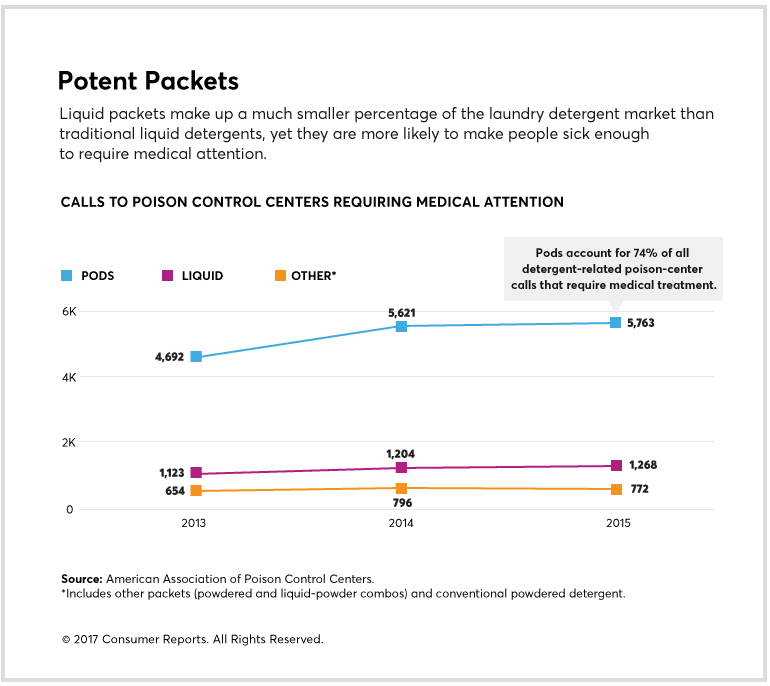Laundry Detergent Pods Can Be Just As Dangerous For Some Seniors As For Kids Image courtesy of Mike Mozart
Since Tide Pods hit the market in 2012, laundry detergent pods have quickly become popular. Unfortunately, they also resulted in reports of kids biting into these shiny, candy-colored packets of poison. New data shows that it’s not just children who are at risk of this potentially lethal confusion; several seniors with dementia have died after consuming detergent pods.
Of the eight deaths directly related to laundry pods in the last five years, two were children — but six were seniors with dementia, a new report from our colleagues at Consumer Reports (Consumerist’s parent company) finds.
Procter & Gamble kicked off the new era of laundry tabs, in pod form, when it launched the Tide Pod in 2012. But just a few months into that year, P&G had to change the packaging design to make them less kid-friendly after poison control centers received more than 250 calls about children getting into the containers and consuming one.
By Nov. 2012, the Consumer Product Safety Commission officially declared the pods harmful to children after finding more than 500 kids had been hurt after playing with or chewing on the pods — and the problem just kept spiraling from there.
Companies changed to opaque packaging so that fewer children would spot the laundry pods inside, but poisonings still went up.
By 2014, at least 17,000 kids had been hurt by laundry pods. In 2015, two Senators introduced legislation seeking to make the CPSC increase safety standards for detergent pods, but it died in committee.
Since then, the advice from Consumer Reports, the CPSC, and other organizations has been to keep the pods out of reach of children under 6. But what about their grandparents?
It’s not uncommon for people with moderate to severe dementia to mistakenly try to eat items that aren’t food. An Alzheimer’s expert gave CR an example of what someone suffering with Alzheimer’s might do: “A hungry person with dementia foraging in a kitchen may misidentify a box of powdered detergent as cereal and still know to pour it in a bowl and mix it with milk from the refrigerator.”
Not only that, but for whatever reason,another expert tells CR, adults with certain forms of dementia are more likely to pick things up and pop them into their mouths, just as very young children routinely do.
An estimated 5.4 million adults in the U.S. currently have Alzheimer’s disease — a number that may well increase as the baby boomer generation continues to age. So there are a lot of folks at risk.
Pods have also proven to be significantly more dangerous than other forms of detergent and cleaning chemicals, accounting for the vast majority of calls to poison control centers, CR points out:
Procter & Gamble is by far the biggest seller of laundry detergent pods, with sales of their brands’ products representing 79% of the market. And that market is booming: Five years after their introduction, pods now account for 17% of all laundry detergent sales.
The Alzheimer’s Association says it has been working with P&G over the last year to come up with a printable checklist caregivers can use to make homes safer for adults with dementia, and is expected to appear on the association’s website later this year.
The best way you can mitigate risk to impaired elders is the same way you can mitigate risk to young children: Don’t keep laundry detergent pods anywhere near them.
“As a result of this new data from the CPSC highlighting the potential risks of laundry detergent pods to adults with dementia, we are amending our advice and recommending that family members caring for anyone who is cognitively impaired not keep pods in the home,” says CR’s chief scientific officer, James Dickerson, Ph.D.
“We also continue to believe that manufacturers should modify the appearance of laundry packets, so they do not look like candy.”
For more information about the risk detergent pods pose to seniors with dementia, and what you can do about it, you can read the full report at Consumer Reports.
Want more consumer news? Visit our parent organization, Consumer Reports, for the latest on scams, recalls, and other consumer issues.


